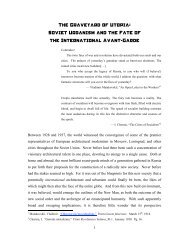MEMORIES OF THE FUTURE - The Charnel-House
MEMORIES OF THE FUTURE - The Charnel-House
MEMORIES OF THE FUTURE - The Charnel-House
You also want an ePaper? Increase the reach of your titles
YUMPU automatically turns print PDFs into web optimized ePapers that Google loves.
his willingness to investigate the historical defeats of the Left, he at times slides into anunmistakable defeatism. 56 Clark revels in the futility and irrelevance of the Left to such aperverse degree that he suggests building an entire politics around it:<strong>The</strong>re will be no future…because there will be no future; only a present in which the Left (alwaysembattled and marginalized, always — proudly — a thing of the past) struggles to assemble the“material for a society” Nietzsche thought had vanished from the earth. And this is a recipe forpolitics, not quietism — a left that can look the world in the face. 57So here, once again, the catchphrase of “no future” makes an appearance. Clark gives noindication that his usage in any way derives from Berardi’s; it seems to be an independentdiscovery. Žižek, in his gloss on Clark’s essay, “Signs from the Future,” has no difficultymaking out its obvious limitations, but seeks to salvage what he considers its basic “grainof truth”: the Left’s excessively “futural” bent, a charge from which he does not exemptMarx himself. 58 <strong>The</strong> rest of Žižek’s piece, however, is rather uneven. He oscillates froma loosely Benjaminian position to the “tragic” worldview espoused by Clark (and Hegel,moreover, Žižek maintains). Early on, he encourages his readers to interpret recent worldevents as the fragmentary “signs of the future” alluded to in the title of his article. Later,Žižek suddenly shifts gears. He accuses Marx of hypostatizing transient features from hiscentury, the period of the emergence, crisis, death, and memory of Marxism, cannot…be redeemed…[T]helanguage of redemption…in the Second International doesn’t apply in the 21 st century. <strong>The</strong> reason that the20 th century cannot be redeemed is that, unlike the 19 th century,…the 20 th century was one of unnecessarysuffering…because the failure of Marxism was unnecessary, which is why it cannot be properly forgotten.”Cutrone, Chris. “1873-1973, the Century of Marxism: <strong>The</strong> Death of Marxism and the Emergence of Neo-Liberalism and Neo-Anarchism.” Platypus Review. № 47: June 2011. Pg. 3.56 Clark criticizes “Marx, Raspail, Morris, Luxemburg, Gramsci, Platonov, Sorel, [and] Pasolini” as part ofa “tradition…[that is] indelibly…unwilling to dwell on the experience of defeat?” Clark, “For a Left withNo Future.” Pgs. 57-58. This characterization is, however, demonstrably false of many of the figures whoare named.He adds later that “[modernity] should learn — be taught — to look failure in the face.” Ibid., pg. 69.57 Ibid., pg. 75. Clark’s emphasis.58 Though he refers to Clark’s argument as a “simplified bleak vision,” he endorses some of its sentiments:“Clark sees the reason for [the Left’s] inability to act in [its] ‘futuralism,’ in its orientation towards a futureof radical emancipation; due to this fixation, the Left is immobilized…[T]he problem with Marx (as well aswith the 20 th century Left)…was not that Marx was too utopian in his Communist dreams, but that hisCommunism was too ‘futural.’” Žižek, Slavoj. “Signs from the Future.” July 25 th , 2012.17






